6 Best Drinks to Relieve Bloating Instantly
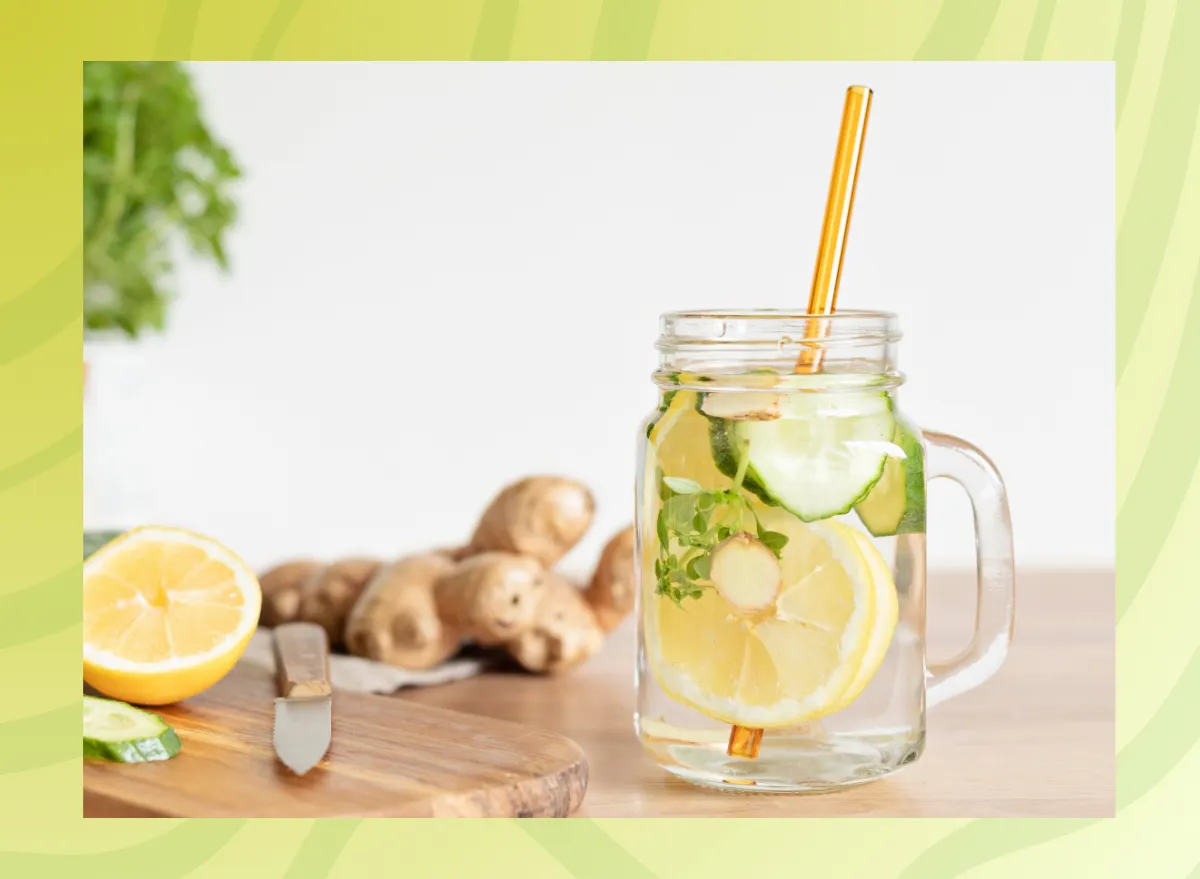
The holidays often come with indulgent meals, decadent desserts, and maybe a few too many cocktails—all of which can leave you feeling uncomfortably bloated. Bloating, characterized by tightness, pressure, or fullness in the stomach, can range from mildly uncomfortable to very painful. For most people, bloating tends to go away after a while, but recurring bloating may point to digestive issues, hormone fluctuations, or other serious medical conditions that cause gas and digestive contents to accumulate. (If your stomach bloating doesn’t go away or you are concerned, speak to your health care professional. )
The most common cause of bloating tends to be excess intestinal gas, overeating, or eating too quickly. Thankfully, relief is within reach. The right debloating drink can help soothe your digestive system, reduce gas, and alleviate that uncomfortable bloated feeling. Whether you’re recovering from a festive feast or just want quick relief, these six beverages are your go-to solutions to combat bloating. Additionally, you can try these 8 Easy Ways to Debloat After Overeating.
The Best Debloating Drinks
Kefir
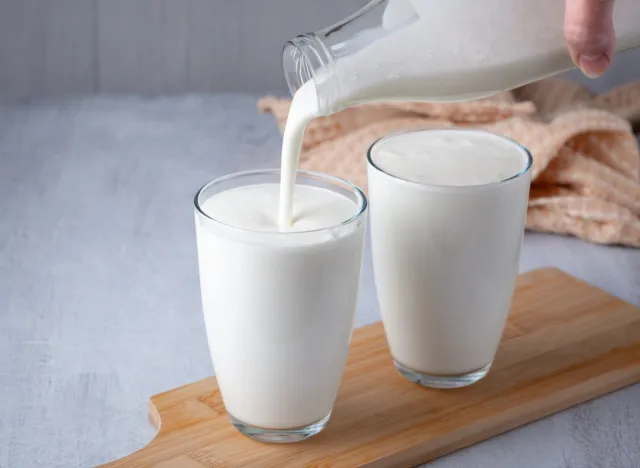
Kefir, a fermented milk drink rich in probiotics, aids in digestion and can be a good debloating drink option. “The beneficial microorganisms present in it help in breaking down the food in the intestines, thereby relieving gas, bloating, and other digestive discomforts,” explains Lauren Manaker, MS, RDN, LDN, CLEC, CPT owner of Nutrition Now Counseling and author of Fueling Male Fertility.
Furthermore, kefir also promotes a balanced gut microbiota, which is vital for overall digestive health. “One study showed that after people consumed the probiotic strains found in kefir every day for three weeks, reduced bloating was observed,” Manaker says.
Ginger Tea
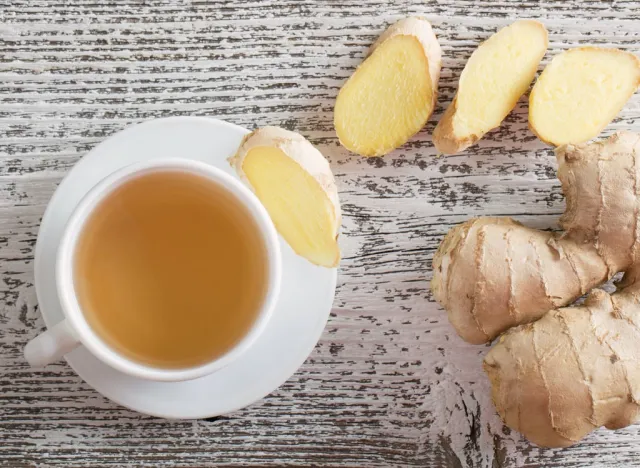
The next time you’re bloated make a cup of ginger tea says Amanda Sauceda, MS, RD owner of The Mindful Gut. “This is a great digestive aid because it encourages your stomach to empty, which means it can help relieve bloating.” In addition, ginger is a carminative which means that “if you’re feeling bloated because you’re gassy then ginger tea can also help,” Sauceda explains.
Green Tea
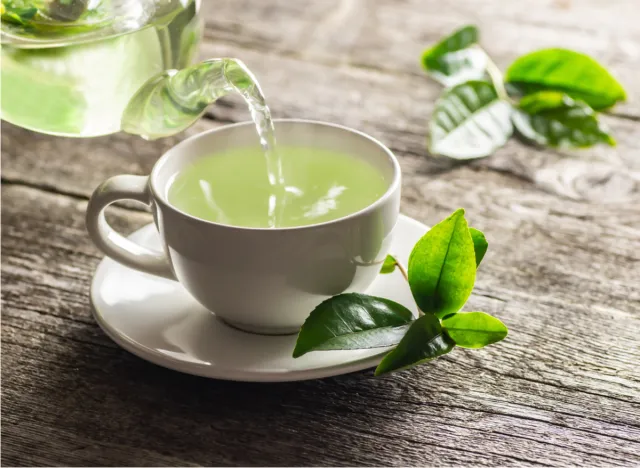
“When it comes to beating back the bloat, green tea is key, thanks to its high levels of antioxidants and catechins,” says Malina Malkani, MS, RDN, CDN owner of Malina Malkani Nutrition and author of Safe and Simple Food Allergy Prevention. Among other health-promoting benefits, catechins have strong anti-inflammatory and antioxidant properties that can help calm the digestive tract, decrease intestinal gas after a meal, and reduce bloating. Malkani says “I love topping off a meal with a cup of green tea to help my body optimize digestion and feel alert.”
Water

“Sometimes going back to the basics is best,” says Maggie Moon, MS, RD author of The Mind Diet. Moon explains that water is a basic but good way to relieve bloating caused by dehydration-related constipation. “When there’s not enough water in the body, it’ll soak up water from food as it goes through the GI tract, which hardens the stool and makes it hard to pass, aka constipation. When stool lingers in the gut, bacteria have more time to metabolize it via fermentation, which produces the gas that causes bloating. This is when drinking water can help restore balance, make it easier to pass stool and take away the cause of bloating.”
Kombucha
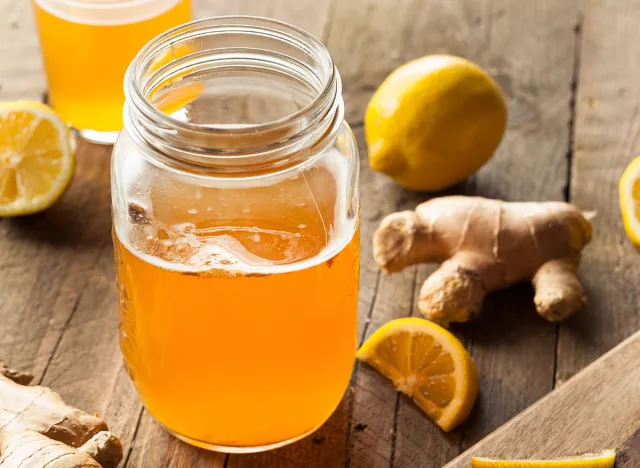
Kombucha is a fermented beverage made from tea, sugar, and a symbiotic culture of bacteria and yeast (SCOBY). While there isn’t a large body of scientific research specifically addressing kombucha’s impact on bloating, some potential factors in kombucha may contribute to digestive health, which could indirectly help reduce bloating for some individuals explains Amy Goodson, MS, RD, CSSD, LD, a registered dietitian and certified specialist in sports dietetics who sits on our Medical Expert Board. Kombucha might influence your gut and digestive health and help with bloating due to their probiotics which are beneficial bacteria that can support the balance of the gut microbiota. A healthy gut microbiota is linked to improved digestion and may help prevent bloating.
In addition, “Fermented foods like kombucha may contain enzymes that could aid in the digestion of certain compounds. Improved digestion may reduce the likelihood of bloating,” says Goodson. Lastly, kombucha is low in sugar as the sugar added to kombucha during the fermentation process is consumed by the SCOBY, resulting in a lower sugar content in the final product. “Excessive sugar intake can contribute to bloating, so choosing beverages with lower sugar levels may help some people manage bloating,” explains Goodson.
Golden Milk
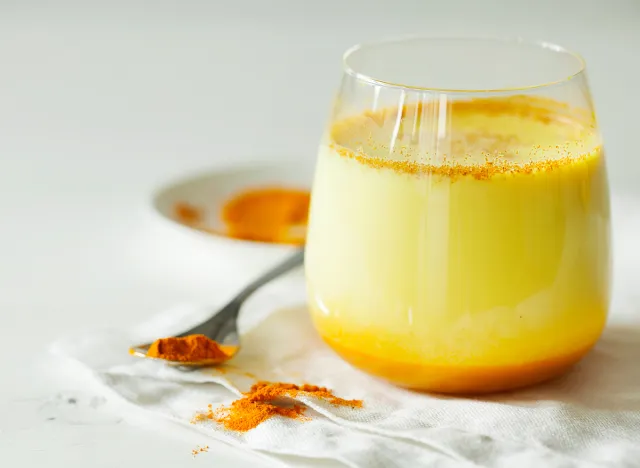
Golden milk is made by combining turmeric, dairy or non-dairy milk, black pepper, ginger, and a touch of honey or other sweetener. Turmeric, a root that looks similar to ginger but is bright orange, contains a compound called curcumin. “Research suggests that curcumin may help reduce bloating and excessive feelings of fullness among those who struggle with indigestion, and ginger is a common remedy for bloating,” Manaker explains.
- Source: Wang, M. C., Zaydi, A. I., Lin, W. H., Lin, J. S., Liong, M. T., & Wu, J. J. (2020). Putative Probiotic Strains Isolated from Kefir Improve Gastrointestinal Health Parameters in Adults: a Randomized, Single-Blind, Placebo-Controlled Study. Probiotics and antimicrobial proteins, 12(3), 840–850. https://doi.org/10.1007/s12602-019-09615-9
- Source: Nikkhah Bodagh M, Maleki I, Hekmatdoost A. Ginger in gastrointestinal disorders: A systematic review of clinical trials. Food Sci Nutr. 2018 Nov 5;7(1):96-108. doi: 10.1002/fsn3.807.
- Source: Carmen Cabrera , Reyes Artacho & Rafael Giménez (2006) Beneficial Effects of Green Tea—A Review, Journal of the American College of Nutrition, 25:2, 79-99, DOI: 10.1080/07315724.2006.10719518
- Source: https://pmc.ncbi.nlm.nih.gov/articles/PMC8839120/
- Source: Haniadka R, Saldanha E, Sunita V, Palatty PL, Fayad R, Baliga MS. A review of the gastroprotective effects of ginger (Zingiber officinale Roscoe). Food Funct. 2013 Jun;4(6):845-55. doi: 10.1039/c3fo30337c. Epub 2013 Apr 24.









